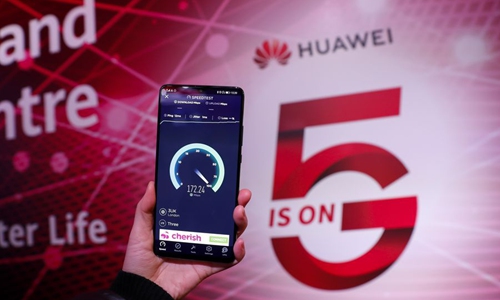HOME >> OPINION
UK allowing Huawei signals a step away from US
By Gao Jian Source:Global Times Published: 2020/2/2 23:13:40

A staff member tests the speed with a Huawei 5G mobile phone at Huawei 5G Innovation and Experience Center in London, Britain, on Jan. 28, 2020. (Xinhua/Han Yan)
While China is fighting against the novel coronavirus, a series of important diplomatic achievements worth celebrating have been marginalized.The UK government in late January announced it would allow Huawei to supply non-core parts to the country's 5G network. The battle against Huawei is about the competition between US alliance-based hegemony and China's new-typed international cooperation featuring win-win contracts and mutual benefits. The UK's approval of Huawei' s participation into the construction of the British 5G network is an important indication of the direction of UK diplomatic strategy and the trend of global political development in the post-Brexit era.
Washington has been making great efforts to force other countries to ban Huawei, the Chinese telecom giant, from their 5G wireless networks. US Secretary of State Mike Pompeo said the UK's sovereignty will be jeopardized if it allows Huawei to participate in its 5G construction. Some US lawmakers criticized the UK's approval of Huawei, saying it puts the US-UK intelligence-sharing partnership at risk.
In order not to provoke Washington too much, London has added "tight restriction" on the use of Huawei parts in its 5G networks. The country also intentionally defended its decision by emphasizing its economic benefits and market needs. However, the Huawei issue presents strong implications for the special relationship between the US and UK.
In the post-World War II map of international relations, the UK has been the most important participant in the US-led Western capitalist camp. Due to their similarity in ideology and political systems, the UK has been the most loyal ally of the US. For half a century, bilateral ties with the US have been a vital part of the UK's foreign policy.
However, over the past five years, especially since US President Donald Trump took office, whether in consideration of the commonality of values or the complementarity of national interests, the special relationship between Washington and London has been deeply questioned in international politics.
The frictions between the UK and the US in diplomatic strategic interests are no less than their cooperation. The foreign policy of the Trump administration, which is centered on "America First," has undermined the transatlantic diplomatic alliance so much that even French President Emmanuel Macron said that "what we are currently experiencing is the brain death of NATO."
In the realm of economy, there is a fundamental divergence in the strategic visions of the future global economic system between Washington and London. The UK's economy is highly dependent on the free and open global trade system. As a result, supporting the global free trade system is the core interest of Great Britain's diplomacy.
However, the current US government denies the significance of globalization and free trade in the consolidation of the Western strategic alliance, and the importance of the special transatlantic trade and investment relationship based on cultural commonality. This fundamental contradiction has become increasingly prominent ever since Trump assumed office, and will intensify in the post-Brexit era.
From a realistic perspective, the UK will be stuck in a passive position in its ties with the US in the post-Brexit era. Once leaving the EU single market and Customs Union, the UK will be in extreme disadvantage in the trade agreement negotiation with the US. Will the US, under Trump's presidency, give preferential treatment to the UK?
So far, Washington has offered no special treatment to London. In future negotiations, the US is likely to treat the UK merely as an independent market, forcing it to open its agricultural market and make concessions on opening its social healthcare system to the US insurance companies at the interest of the US. Since the nature of UK-US ties is now dramatically converted, the UK will have no alternative but to abandon its illusion that it can rely on the US.
Over the past two years, the British government has introduced a diplomatic initiative "Global Britain," aiming at building a more international and more outward-oriented diplomacy. Britain will thus always be a defender of the principle of multilateral diplomatic system and free trade.
How will the UK show its innovative diplomacy in the post-Brexit era? Setting itself free from its past Cold War diplomatic ideology and the outdated mind-set of major power relations will be a key.
The author is deputy director of the Center for British Studies, Shanghai International Studies University. opinion@globaltimes.com.cn
Posted in: VIEWPOINT